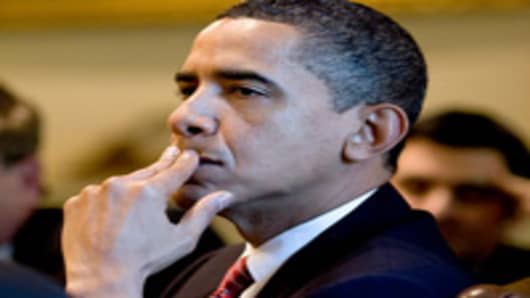With a flurry of green-focused agreements announced, the world’s two largest carbon emitters—the US and China—may have put the final nail in the coffin of any global carbon reduction agreement at the United Nations' highly anticiated climate change conference in Copenhagen.
The battle to regulate greenhouse gas emissions, however, will carry on—most likely on more economically sound fronts, says experts, under the guise of job creation and infrastructure modernization.
“Stick a fork in it,” says a managing director at a private equity fund focused on clean energy technologies, about the chances of agreement in at the Copenhagen. “But now the real fun begins.”
The agreements signed in Beijing Tuesday—covering everything from electric vehicle production and renewable energy development to carbon sequestration and energy efficiency efforts—may foreshadow a new approach by the Obama administration’: reframe the discussion about climate change as a New Deal-like opportunity to revamp the country’s carbon-heavy energy, construction and transportation sectors and get Americans back to work, all while reducing U.S. carbon emissions, of course.
“It won't really break new ground,” says Matt Latourneau, director of communications at the energy institute of the US Chamber of Commerce, USCoC, about any agreement or action coming out of the Copenhagen conference, known as COP 15.
The chamber, a vocal opponent of current proposed American climate change policies, would like a quick autopsy and burial for next month’s conference in the Danish capital.
“It’s been clear Copenhagen would be mainly a political agreement,” says Letourneau.
But in recent climate change negotiations, all-nation confabs—like Kyoto in 1997 and Copenhagen in 2009—are not really where the action is anyway, says analysts.
Stephen Marcus, an analyst at research and advisory services firm Cleantech Group LLC, made that point in a recent note to client, “Why COP15 Doesn’t Matter”.
Marcus noted that more meaningful climate change initiatives have come out of the G20, the US-led Major Economies Forum, MEF, on Energy and Climate, and, what he calls, the “G-2” of China and America.
“The bureaucratic and consensus-seeking nature of the (COP15) discussions, where countries like Vanuatu are given equal representation, are counterproductive to effecting changes quickly,” Marcus told clients. “The top economies, and certainly the private sector, are not letting [the UN] bureaucracy stand in the way of getting things done.”
Climate change insiders say watch for more national legislation and multilateral agreements that say less about carbon emissions and more about bigger mandates for renewable energy generation, reductions in subsidies for “dirty” energy sources that no longer employ as many people as in the past and increased subsidization of energy efficiency projects to revitalize the commercial and residential real estate sectors.
All of these efforts will likely be sold as job-creating modernization efforts that will stimulate economic growth and promote energy security.
“Jobs are and should be at the heart of the U.S. conversation and the Chinese conversation,” says Jake Schmidt, international climate policy director for the environmental non-profit Natural Resources Defense Council, NRDC, about the reshaping of the climate change debate. “We’re at a central point in the discussion about what those jobs are. The main focus is on how do you do it, and how do you do it right.”
Cleantech Group’s Marcus points says that the dialogue is shifting from the abstract shift idea of making money from carbon trading to innovative ideas with tangible, physical results.
“New technology and business model breakthroughs encourage creative destruction, usher in new industries and create new jobs in new industries,” he says.
Schmidt warns that both the U.S. government and some key corporate citizens need to get moving. “We are losing our competitive advantage on this,” he says. “We want to unleash American ingenuity.”
He sees Obama’s recent discussions with China and the Asia Pacific Economic Cooperation, APEC, “a clear signal that we want to finalize a legally binding agreement.”
The Copenhagen conference won’t yield a big deal. “It’s not going to get done this year," says Schmidt. "World leaders will finalize [an agreement] in the next year, and they can finalize it in months, not years.”
Others, like Letourneau , say now or later, that is still the wrong approach; with today’s economic realities and a better understanding of carbon emissions production, a new worldwide Kyoto-like agreement really isn’t workable in individual countries.
“It doesn’t reflect the resource base of different countries,” he says, pointing out that national or regional multilateral approaches may achieve a carbon reduction goal more effectively.
Instead, the Chamber of Commerce is pushing for regional agreements. He added that reduced COP15 expectations are “a sign that the bottom-up approach is winning the day.”
Though there are diminished expectations for Copenhagen, the US-China agreements appear to come at a good time for climate change advocates in Congress and the White House.
Washington will soon turn to tackling climate change policy now that the debate over health care is waning. Both the House’s Markey-Waxman bill and the Senate’s Boxer-Kerry bill call for hard emissions reductions targets and clean energy development.
What's more, the Environmental Protection Agency, EPA, is waiting in the wings to regulate carbon if direction isn’t forthcoming from Capitol Hill, even though EPA administrator Lisa Jackson prefers legislators set policy.
“The threat of regulation has been hanging over the process,” says Letourneau, who said his group also prefers Congress take the lead.
“It will take a long time to implement [regulation], and there will be legal action holding it up.” he explains.
The NRDC’s Schmidt agrees that “the best route is the legislation route” and he expects a carbon emissions policy of some kind to be ratified by Congress by mid-2010.
“We’ve come a long way. Are we done? No," says Schmidt.



